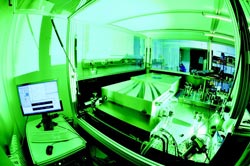Green power – femtosecond laser system achieves record power

Femtosecond laser system with 280 W at 515 nm installed at the MPQ in Garching. Fraunhofer Institute for Laser Technology ILT, Aachen<br>
In the KORONA cooperation project, research scientists from the Fraunhofer Institute for Laser Technology ILT in Aachen installed a femtosecond laser at the Max Planck Institute of Quantum Optics MPQ in Garching. The turn-key laser is based on a Yb:INNOSLAB amplifier with frequency doubling. No other laser system has ever offered more output with diffraction-limited beam quality in the visible spectral range.
Ultrashort laser pulses are an established tool in science and industry. In many areas, the range of applications can be expanded by scaling them up to high average output power. In recent years, beam source development has seen great progress on this front. Average output power of several hundred W with diffraction-limited beam quality have been demonstrated using Ytterbium-doped laser media at 1 µm wavelength in fiber, INNOSLAB and thin-disk geometry. The Fraunhofer ILT scientists hold the record with their Yb:INNOSLAB amplifier, generating an output power of 1.1 kW.
These beam sources must be reliable and easy to operate if they are to be used widely in science and industry. The scientists from Fraunhofer ILT have installed a laser system at the MPQ which delivers an average power of 280 W at 515 nm wavelength and an almost diffraction-limited beam quality of M²
Ultra-short-pulse lasers have manifold applications in materials processing. It is widely recognized that they offer higher-precision ablation than lasers with longer pulses. The femtosecond laser can process materials such as glass which are otherwise transparent for light with the laser wavelength. This ability is based on the process of multiphoton absorption which occurs at high peak intensities. Frequency conversion from the infrared to the green spectral range doubles the photon energy. As a result, fewer photons are needed for absorption, making it more effective.
Another application of green laser radiation is the processing of copper and other materials which absorb radiation particularly well in this spectral range. Scaling up the average power permits a higher throughput and renders industrial use economically viable, as the costs per watt are significantly reduced. The aim of the KORONA cooperation project between the Max-Planck-Gesellschaft and the Fraunhofer-Gesellschaft is to produce coherent radiation with wavelengths in the extreme ultraviolet region below 100 nm. This wavelength range can be opened up by generating high harmonics of femtosecond radiation. Scaling up the average power creates the potential for new applications in this wavelength range. What’s more, INNOSLAB lasers are commercially available. The company EdgeWave GmbH, a spin-off from Fraunhofer ILT, has been marketing pulsed solid-state lasers based on the INNOSLAB platform for scientific and industrial use for about ten years. The company Amphos GmbH, another Fraunhofer ILT spin-off, develops and sells Yb:INNOSLAB lasers in the power range from 100 W to 1000 W.
The Yb:INNOSLAB amplifier will be presented at LASER World of Photonics in Munich from May 23 to 26, 2011, on the joint Fraunhofer booth (Hall C2, Booth 330). Dipl.-Ing. Hans-Dieter Hoffmann will also give a talk about the Yb:INNOSLAB amplifier in the Photonics Forum at the trade show.
Session: Solid state lasers – novel developments
May 24, 2011, 14:00 h to 16:30 h
Photonics Forum, Hall B2, Booth 421
16:20 h: “High Power Ultrafast Laser with Average Power up to kW Range”, Dipl.-Ing. Hans-Dieter Hoffmann
Contacts
If you have any questions our experts will be pleased to assist:
Fraunhofer Institute for Laser Technology ILT
Dr. rer. nat. Peter Rußbüldt
Ultrafast Lasers
Phone +49 241 8906-303
peter.russbueldt@ilt.fraunhofer.de
Dipl.-Ing. Hans-Dieter Hoffmann
Lasers and Optics
Phone +49 241 8906-206
hansdieter.hoffmann@ilt.fraunhofer.de
Fraunhofer Institute for Laser Technology ILT
Steinbachstr. 15
52074 Aachen
Phone +49 241 8906-0
Fax +49 241 8906-121
Max Planck Institute of Quantum Optics MPQ
Prof. Dr. Ferenc Krausz
Phone + 49 89 32905-602
Fax + 49 89 32905-649
ferenc.krausz@mpq.mpg.de
Max Planck Institute of Quantum Optics MPQ
Hans-Kopfermann-Str. 1
85748 Garching
Phone + 49 89 3 29 05-0
Fax + 49 89 3 29 05- 200
Media Contact
All latest news from the category: Machine Engineering
Machine engineering is one of Germany’s key industries. The importance of this segment has led to the creation of new university degree programs in fields such as production and logistics, process engineering, vehicle/automotive engineering, production engineering and aerospace engineering among others.
innovations-report offers informative reports and articles covering technologies such as automation, motion, power train, energy, conveyor, plastics, lightweight construction, logistics/warehousing, measurement systems, machine tools and control engineering.
Newest articles

Innovative 3D printed scaffolds offer new hope for bone healing
Researchers at the Institute for Bioengineering of Catalonia have developed novel 3D printed PLA-CaP scaffolds that promote blood vessel formation, ensuring better healing and regeneration of bone tissue. Bone is…

The surprising role of gut infection in Alzheimer’s disease
ASU- and Banner Alzheimer’s Institute-led study implicates link between a common virus and the disease, which travels from the gut to the brain and may be a target for antiviral…

Molecular gardening: New enzymes discovered for protein modification pruning
How deubiquitinases USP53 and USP54 cleave long polyubiquitin chains and how the former is linked to liver disease in children. Deubiquitinases (DUBs) are enzymes used by cells to trim protein…



